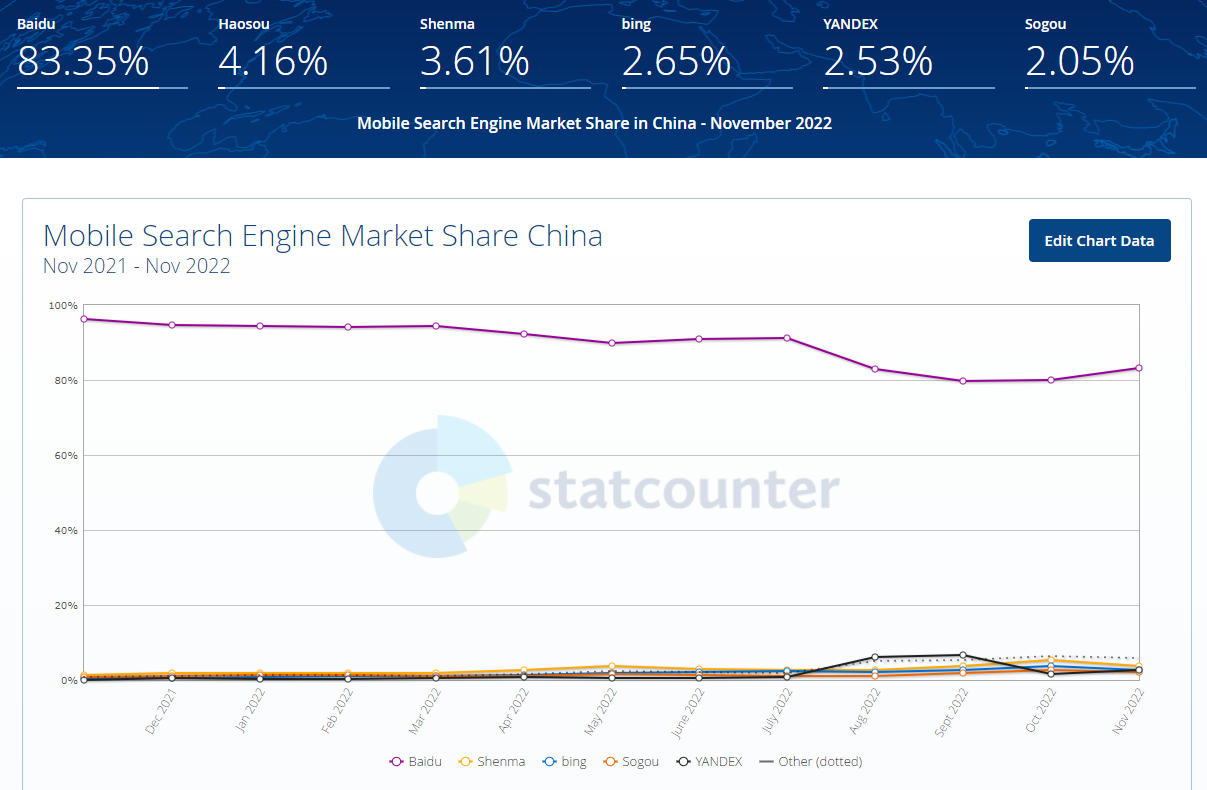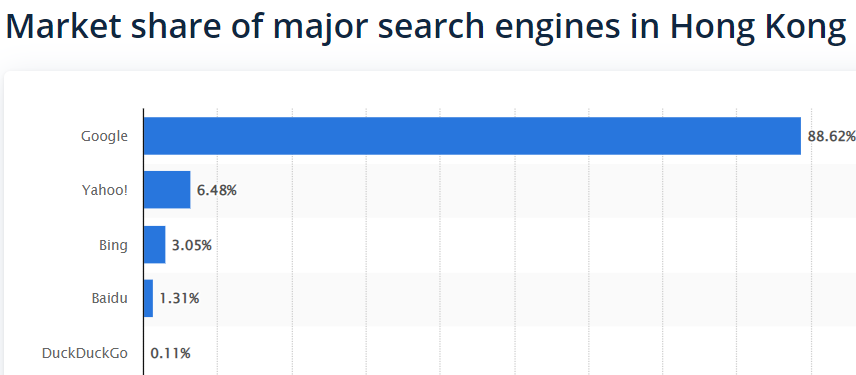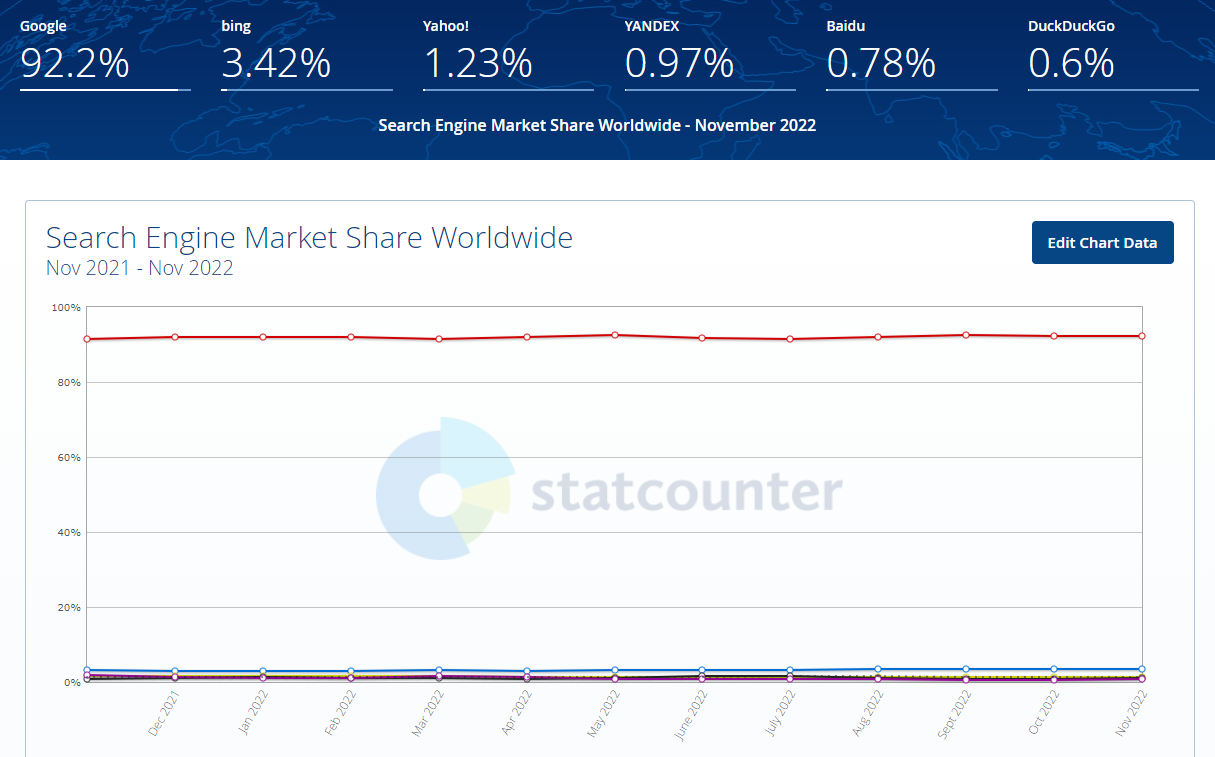Google dominates the global search engine market, but in China, local search engines lead the way as Google is banned. Baidu holds the majority market share, while other search engines continue to grow.
This article explores the Chinese search engine market and discusses how digital marketing strategies can attract more traffic.

The scale of China's search engine market continues to grow
As of April 2023, the user base of Chinese search engines had reached 840 million, accounting for 78% of all netizens. Compared to December 2022, there was an increase of 39.63 million search engine users.
These figures illustrate the ongoing expansion of the Chinese search engine market. Consequently, search engine optimization (SEO) remains a crucial strategy for all website owners seeking to increase traffic.
Rankings and Market Shares of Chinese Search Engines
As of February 2023, the rankings of the Top5 in the Chinese search engine market share (across all platforms, including computers, tablets, and mobile phones, etc.) were as follows:
- Baidu: 55.8%
- Bing: 14.6%
- Sogou: 14.5%
- Haosou: 5.1%
- Google: 4.9%

Baidu, as the foremost leader in China's search engine market, continues to hold a significant market share. However, the trend shows a rapid decline in Baidu's dominance, while the market shares of other search engines like Bing and Sogou are swiftly expanding.
Mobile Search Engine Market Share
The primary search engine terminal in China is currently mobile phones. By 2023, the number of mobile search engine users is projected to reach 840 million, constituting 78% of mobile netizens.

Chinese Search Engine: Baidu
Even though Baidu's market share has been declining, it still leads the Chinese search engine market.
Baidu is a local search engine, producing results primarily in simplified Chinese. It is also more friendly to local Chinese websites.
Technically, Baidu bots favor HTML pages and do not handle JavaScript effectively.
The search result ranking on Baidu is primarily determined by the website's homepage, and ranking information still includes outdated meta keywords.
Chinese Search Engine: Bing
Bing, a search engine, is popular among Chinese users because it offers both domestic and international versions.
Users can find many English results on the international version, making it a good alternative for users needing to access foreign websites.
Being a part of Microsoft, Bing sees a significant amount of traffic from Windows users.
Chinese Search Engine: Sogou
Sogou, now a subsidiary of Tencent, is the default search engine for various programs such as QQ, QQ Browser, and WeChat. This affiliation with the Tencent ecosystem provides several benefits.
Sogou's search engine prioritizes website originality, article content quality, and website authority.
An article's title and tags are significant factors in website ranking. Similar to Baidu, Sogou also prefers websites hosted on servers within China.
Chinese Search Engine: Google
Globally, Google dominates the search engine market, holding over 90% market share in many countries.
However, Google has completely withdrawn from the Chinese market, and Chinese users cannot access it using a standard network.
Chinese Search Engine: Shenma
Shenma Search, backed by Alibaba and UC, gets most of its traffic from mobile users, aligning with the ongoing trend of the internet era.
Hong Kong Search Engine Market
Consider the scenario in Hong Kong where users have access to Google.
As of February 2023, Google dominates the search engine market in Hong Kong, with a market share of 88.8%. If your target customers are in the Hong Kong, Macau, and Taiwan regions, then the search engine you should mainly use is Google.
In addition, Bing's market share in Hong Kong is 4.07%, Yahoo's market share is 3.71%, and other search engines have a market share of 3.46%, including Baidu, Sogou, Yandex, etc.

Global Search Engine Market
If you operate a cross-border e-commerce business or target customers globally, you cannot overlook Google. As a dominant force in the global search engine market, Google maintains a stable market share.

Is SEO Still Worthwhile in 2024?
The digital marketing landscape is continually evolving, with new platforms and channels emerging regularly. Despite this, search engine optimization (SEO) remains a valuable investment. Here's why:
- Flexibility: Websites optimized for search engines offer more flexibility than social platforms. Constraints on social platforms, such as the inability to add external links in WeChat public account articles or the need for approval on Xiaohongshu's product notes, do not exist on your own website. You have the freedom to add links and create content, offering a superior user experience.
- Ownership: A website is your property, whereas a platform account is just for use. Owning a website is akin to owning a shop where you decide what to display. In contrast, social platforms are more like rented market stalls, subject to the market rules.
- Cost-effective: If you're already operating a content social platform such as Toutiao or Baijia, maintaining your website isn't costly. You can publish your content on multiple platforms.
- Universal SEO principles: The basic principles of website SEO also apply to social platforms. These will be discussed in further detail in future posts.
In a time when information channels are diversifying and platforms like Douyin, Xiaohongshu, and WeChat are gaining popularity, it's essential to consider where the most traffic can be obtained. Thus, owning a website and operating on a high-traffic platform is recommended, whether you're promoting content or products.
Search Engine Operations
After analyzing the data, the next step for digital marketers is to plan an SEO or SEM strategy.
If you have a bilingual website, or if your target audience is in Hong Kong, Macao, Taiwan, or overseas, focus on Google. Consider Baidu and Bing if you have additional resources.
If your website is solely for Mainland China users, Baidu and Bing suffice.
However, with more users choosing video platforms and social media in China's internet environment, platforms like Douyin and Xiaohongshu also warrant time for planning and research.
DigitalMarketingTed will continue to offer strategies and guidelines for Google, Baidu, and other SEOs, as well as social media platform operations. This will help you attract more traffic and achieve better conversion results with less money and time.





